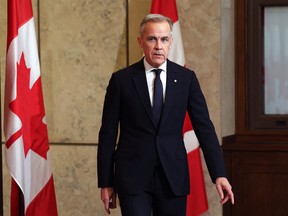Carney met Thursday morning with provincial and territorial leaders about Canada’s response
Carney met Thursday morning with provincial and territorial leaders about Canada’s response

OTTAWA — Canada is hitting back against U.S. auto tariffs, slapping a 25 per cent retaliatory border levy on all American-made vehicles not covered by free trade deals but exempting auto parts.
In Ottawa Thursday morning, Prime Minister Mark Carney said Canada would retaliate to part of the new 25 per cent U.S. border levy on foreign-made autos and parts as he warned that more American border levies may be coming on lumber, agriculture, pharmaceuticals and semiconductors.
He said Canada would impose a 25 per cent border levy on vehicles made in the U.S. and would redistribute the funds to workers and businesses affected by the ongoing trade war with the Americans.
But he noted Canada would not go as far as U.S. President Donald Trump because it would exempt U.S.-made auto components from the new tariffs because of the “benefits” of the deeply integrated U.S.-Mexico-Canada supply chain.
During the Liberal leadership campaign, Carney said he supported “dollar-for-dollar” retaliatory tariffs against the U.S.
He also reiterated that Canada and the U.S. will need to completely rework their trade and security relationship after a new government is elected on April 28.
“In the year I was born, Canada and the United States signed the auto pact agreement that ended auto tariffs between our nations and began a 60-year period… of close cooperation, partnership, job growth and prosperity in that era,” Carney said.
“That era has now ended, unless the United States and Canada can agree on a new comprehensive approach,” he added.
At 12:01 am ET Thursday, the U.S. began applying 25 per cent tariffs on vehicle and component imports that aren’t covered by the Canada-U.S.-Mexico free trade agreement (CUSMA).
The effects of the new American auto tariffs were felt nearly immediate on both sides of the border.
In the U.S., American auto giant Stellantis temporarily laid off 900 workers in Michigan and Indiana because of slowdowns in the company’s Canadian and Mexican plants, Reuters reported.
Stellantis, the parent company of Chrysler, also confirmed Thursday morning that it was “temporarily pausing production” at its assembly plant in Windsor, Ont., starting Monday largely due to the new U.S. tariffs.
“Stellantis continues to assess the effects of the recently announced U.S. tariffs on imported vehicles and will continue to engage with the U.S. Administration on these policy changes,” company spokesperson LouAnn Gosselin said in a statement.
Carney warned that Canadians would feel the pain before things got better, noting that Trump has promised further tariffs on “key” sectors that include softwood lumber and agriculture. Those are two major Canadian exports.
When asked if Canada was headed towards a recession, Carney’s response was akin to the saying: when America sneezes, Canada catches a cold.
“It is usually the case that when the United States has a recession that it’s very difficult for Canada to avoid something similar,” he responded.
But he said he expects the Trump administration to eventually pull back on the trade war as Americans felt the pain of the trade war as well.
“Given the prospective damage to their own people, the American administration should eventually change course, but I don’t want to give false hope,” Carney said.
Thursday morning, federal party leaders came out swinging with their parties’ proposals to counter the effects of the new U.S. auto tariffs.
Conservative Leader Pierre Poilievre promised to remove the federal sales tax on Canadian-made vehicles and called on provinces to do the same with their provincial taxes. He also committed to setting aside $3 billion for short-term credit lines and low-interest loans to workers and businesses affected by the trade war.
“Axing the GST on a $50,000 Canadian-made automobile will save $2,500 to the car buyer. By saving cash-strapped Canadians families their hard-earned money, we will increase demand for Canadian-made cars and keep more workers on the job,” Poilievre said.
Speaking in Ottawa, NDP Leader Jagmeet Singh promised to revive a World War II-era five- or ten-year “victory bond” program that he says would allow Canadians to invest their money towards helping build federal infrastructure.
“If you hold it to maturity, you would get all the revenue tax-free. We’re going to need to raise money to be able to build the roads, the bridges, the infrastructure we need. Instead of relying solely on banks and paying debt and interest to those banks, let’s pay interest to Canadians instead,” Singh said.
National Post
cnardi@postmedia.com